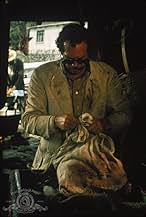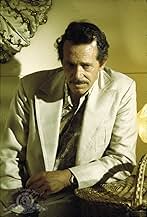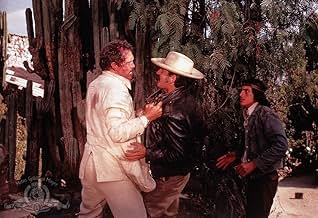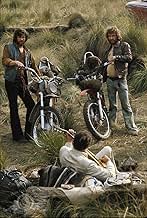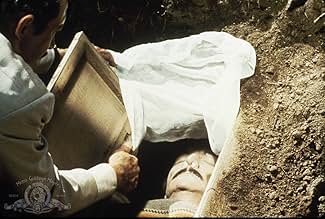Tragam-me a Cabeça de Alfredo Garcia
Título original: Bring Me the Head of Alfredo Garcia
AVALIAÇÃO DA IMDb
7,4/10
23 mil
SUA AVALIAÇÃO
Um pianista de bar e sua namorada prostituta viajam pelo submundo mexicano para receber uma recompensa pela cabeça de um gigolô morto.Um pianista de bar e sua namorada prostituta viajam pelo submundo mexicano para receber uma recompensa pela cabeça de um gigolô morto.Um pianista de bar e sua namorada prostituta viajam pelo submundo mexicano para receber uma recompensa pela cabeça de um gigolô morto.
- Direção
- Roteiristas
- Artistas
- Prêmios
- 2 indicações no total
Emilio Fernández
- El Jefe
- (as Emilio Fernandez)
Donnie Fritts
- John
- (as Donny Fritts)
Chalo González
- Chalo
- (as Chalo Gonzalez)
Avaliações em destaque
First, I'm sure everyone commenting on this film has seen the documentary on Peckinpah, and the comments made by the film critics regarding this film. If I may quote one of the critics, and I'm sure you all agree "It's the one film of Peckinpah's that everyone tries to imitate". Even Tarantino does to some degree. I have issues with Quentin Tarantino from a cinematic and artistic point of view, but that is another review. Warren Oates' performance was flawless, as he actually assumes the identity Of Sam Peckinpah as a gesture of appreciation for gracing him with his first starring vehicle.
Warren Oates was taking Sam's journey for him, as Sam looked from behind the lens. This movie was Peckinpah at his best and his worst at the same time. The old Peckinpah themes are there; Mexico is the final frontier, where one can continue to be what he once was in a changing world, but eventually Mexico begins to change as well. As I said in my review of "Junior Bonner" (be sure to check it out, and get back to me)progress is the main antagonist in the lives of Peckinpah's characters.
Junior Bonner and Bennie (Oates' Character) have a common foe, the twentieth century, which is why we find Bennie in Mexico. The chance to improve his situation, and establish a solid relationship with his hooker girlfriend (played with tough sincerity by Isela Vega) arrives at a time in Bennie's life when he least expects it, but it's not as easy as it is set out to be. All he has to do is bring this head to "El Hefe", and at the last minute BAM!! Bennie grows a conscience. Along the way he loses his woman, and then just goes nuts, thus revealing "The Diseased Soul of Sam Peckinpah".
My favorite scene is actually the picnic, where Elita and Bennie discuss their future. Elita begs Bennie to ask her to marry her, he does and she begins to weep. The simple fact that he says it is a tender moment, and shows how the slightest thing can arouse a woman's emotions. Jerry Fielding's musical score, which successfully created the mood and atmosphere for "Straw Dogs" (my all time favorite Peckinpah film) is present, but very muted. Still, this may be the best scene of the film.
Sam Peckinpah finally had complete control to dictate the direction of this film; Free from the money men, and left to his own devices in Mexico where he felt at home. A lot of people say that Pat Garret and Billy the Kid was the last Peckinpah masterpiece, but I think Alfredo Garcia was the last one. It throws you off at the beginning with the horses, then all of a sudden a Corvette screeches by; This is the paradox that really signifies that "The West" is over, bringing Sam Peckinpah and his love for the west full circle.
The critics literally hated this film, but 30 years later because of it we have a Martin Scorcese, a Robert Rodriguez, and a Quentin Tarantino (yeah) to name a few, as well as achieving underground cult status. I'm proud to call "Bring Me the Head of Alfredo Garcia" one of my favorite films.
Warren Oates was taking Sam's journey for him, as Sam looked from behind the lens. This movie was Peckinpah at his best and his worst at the same time. The old Peckinpah themes are there; Mexico is the final frontier, where one can continue to be what he once was in a changing world, but eventually Mexico begins to change as well. As I said in my review of "Junior Bonner" (be sure to check it out, and get back to me)progress is the main antagonist in the lives of Peckinpah's characters.
Junior Bonner and Bennie (Oates' Character) have a common foe, the twentieth century, which is why we find Bennie in Mexico. The chance to improve his situation, and establish a solid relationship with his hooker girlfriend (played with tough sincerity by Isela Vega) arrives at a time in Bennie's life when he least expects it, but it's not as easy as it is set out to be. All he has to do is bring this head to "El Hefe", and at the last minute BAM!! Bennie grows a conscience. Along the way he loses his woman, and then just goes nuts, thus revealing "The Diseased Soul of Sam Peckinpah".
My favorite scene is actually the picnic, where Elita and Bennie discuss their future. Elita begs Bennie to ask her to marry her, he does and she begins to weep. The simple fact that he says it is a tender moment, and shows how the slightest thing can arouse a woman's emotions. Jerry Fielding's musical score, which successfully created the mood and atmosphere for "Straw Dogs" (my all time favorite Peckinpah film) is present, but very muted. Still, this may be the best scene of the film.
Sam Peckinpah finally had complete control to dictate the direction of this film; Free from the money men, and left to his own devices in Mexico where he felt at home. A lot of people say that Pat Garret and Billy the Kid was the last Peckinpah masterpiece, but I think Alfredo Garcia was the last one. It throws you off at the beginning with the horses, then all of a sudden a Corvette screeches by; This is the paradox that really signifies that "The West" is over, bringing Sam Peckinpah and his love for the west full circle.
The critics literally hated this film, but 30 years later because of it we have a Martin Scorcese, a Robert Rodriguez, and a Quentin Tarantino (yeah) to name a few, as well as achieving underground cult status. I'm proud to call "Bring Me the Head of Alfredo Garcia" one of my favorite films.
It is my humble opinion that Bring Me the Head of Alfredo Garcia comes as close to capturing the maddening drive of man as any movie. That is to say that it sits at the same table as the greats, perhaps across the way from Citizen Kane or Raging Bull. If you contest this it is perhaps only because the film is not as beautiful, not as magnificent, as the rest of its ballpark. I would argue that that is partially the point.
Bennie's quest is stripped to its core so that the brutality of the film is expressive of Bernie himself. There is not a violent film with more validity for its actions than this one, it is the maddening human mind which causes deaths here. Peckinpah shows us everything that is important in this man's life and then shows us what a man is capable of doing once all that is taken away. The difference between this film and other similar films is perhaps that the movie has such humble beginnings. We build ourselves inside of Bennie. When we first meet him he is casually and happily playing the piano, quietly dreaming of settling into a different kind of love. We share a quiet picnic with him, witness his wedding proposal.
Perhaps also there has never been a chaotic killing spree that has seemed this environmental. While usually the hero goes on a rampage in a way that is appropriately heroic itself, Bennie is no hero. He is a man forced into a situation by the world around him, as it seems he is always forced into situations. Since he is never the man he wants to be it seems natural that he would become the kind of man that is the amalgamation of love and hate.
All the emotion a movie in this genre could handle.
Bennie's quest is stripped to its core so that the brutality of the film is expressive of Bernie himself. There is not a violent film with more validity for its actions than this one, it is the maddening human mind which causes deaths here. Peckinpah shows us everything that is important in this man's life and then shows us what a man is capable of doing once all that is taken away. The difference between this film and other similar films is perhaps that the movie has such humble beginnings. We build ourselves inside of Bennie. When we first meet him he is casually and happily playing the piano, quietly dreaming of settling into a different kind of love. We share a quiet picnic with him, witness his wedding proposal.
Perhaps also there has never been a chaotic killing spree that has seemed this environmental. While usually the hero goes on a rampage in a way that is appropriately heroic itself, Bennie is no hero. He is a man forced into a situation by the world around him, as it seems he is always forced into situations. Since he is never the man he wants to be it seems natural that he would become the kind of man that is the amalgamation of love and hate.
All the emotion a movie in this genre could handle.
BRING ME THE HEAD OF ALFREDO GARCIA is Sam Peckinpah's most intimate and underrated film. I can think of few other films of this caliber that are as neglected or unsung.
A bizarre, sleazy film that has Peckinpah's signature trademarks - his romance with John Huston's TREASURE OF THE SIERRA MADRE, loners, Mexico at it's grittiest, slow-motion violence.
When I saw it the first few times, the film seemed to wander aimlessly at various stretches and Peckinpah's direction felt tired to me. Even though Peckinpah can still lift you two inches off the ground with his action sequences, it doesn't have the kinetic impulse running thru it like THE WILD BUNCH, STRAW DOGS, THE GETAWAY or CROSS OF IRON.
Knowing now what I do about his career, I suspect the tiredness was authentic, due to his battles with studio executives and a self- destructive life. This knowledge and the ensuing years of experiencing the picture, have taken on added meaning and enriched it for me. Bennie the down and out piano player, memorably played by Peckinpah's Bogart, Warren Oates, is a wonderful alter ego for the director.
Starring Oates and Isela Vega and a strong supporting cast which includes Gig Young, Robert Webber and Emilio Fernandez. The excellent score is by Peckinpah's best composer, Jerry Fielding.
It may take several viewings but sit back and relish the sad poetry of an authentic film artist, Sam Peckinpah.
A bizarre, sleazy film that has Peckinpah's signature trademarks - his romance with John Huston's TREASURE OF THE SIERRA MADRE, loners, Mexico at it's grittiest, slow-motion violence.
When I saw it the first few times, the film seemed to wander aimlessly at various stretches and Peckinpah's direction felt tired to me. Even though Peckinpah can still lift you two inches off the ground with his action sequences, it doesn't have the kinetic impulse running thru it like THE WILD BUNCH, STRAW DOGS, THE GETAWAY or CROSS OF IRON.
Knowing now what I do about his career, I suspect the tiredness was authentic, due to his battles with studio executives and a self- destructive life. This knowledge and the ensuing years of experiencing the picture, have taken on added meaning and enriched it for me. Bennie the down and out piano player, memorably played by Peckinpah's Bogart, Warren Oates, is a wonderful alter ego for the director.
Starring Oates and Isela Vega and a strong supporting cast which includes Gig Young, Robert Webber and Emilio Fernandez. The excellent score is by Peckinpah's best composer, Jerry Fielding.
It may take several viewings but sit back and relish the sad poetry of an authentic film artist, Sam Peckinpah.
Watching this unforgettable near masterpiece for the first time it's impossible to understand why it isn't regarded as one of the greatest movies of the 70s - a decade that produced an astonishing amount of classics. How Maltin can dismiss it with the throwaway comment "sub-par bloodbath" defies belief! Almost everything about this movie is perfect, but the cornerstone is Warren Oates performance, perhaps his greatest. Rarely do you see such a completely engrossing, believable portrayal of a man who has lost EVERYTHING, who knows he cannot win, but also knows that he must keep going to the very end. Once seen, never forgotten may seem like a trite comment, but in this case it says it all. You will NEVER forget this movie!
Sam Peckinpah's hallucinatory bloodbath was considered career suicide when released in 1974; today, this scuzzy, squirrelly road movie looks less like self-parody than self-autopsy. As such, it has aged better than some of Peckinpah's more "reputable" movies. Like John Cassavetes' THE KILLING OF A CHINESE BOOKIE and Brian DePalma's BLOW OUT, it's a thinly veiled allegory about the muck a filmmaker will wade through to get his movies made. Peckinpah's stand-in is Warren Oates, an actor who always brought a rotgut reek of authenticity to his roles; here, he's a washed-up pianist who stands to score a bundle if he completes one simple task--fetching the severed head of the yutz who impregnated a Mexican warlord's daughter. When Oates isn't defending his not-unwilling girlfriend (Isela Vega) from rapists Kris Kristofferson and Donnie Fritts (!), he's carrying on a boozy, uh, tête-à-tête with the brown-bagged head on an endless drive down Mexico way. But Oates isn't the villain--that distinction is reserved for the effete suits (the slimy duo of Gig Young and Robert Webber) on his tail. Oates is just a guy trying to maintain enough of his integrity to see a dirty job through: He's one of those screw-you Peckinpah heroes who completes his assignment just so he can wage war on his bosses. The movie has such a gritty, oozing, flyblown feel you could swear it was shot on No-Pest Strips instead of celluloid, and as Oates bears down on oblivion it slows to a druggy crawl: Each cut is like a dying man's blink. No matter-in its sick, ornery way, this is one of the director's most personal movies, and worthy of far better than its laughingstock status.
Você sabia?
- CuriosidadesAccording to Gordon T. Dawson, principal photography was marked with an overwhelming sense of melancholy and defeat, perhaps engendered by Sam Peckinpah's use of cocaine (introduced to him by Oates). The screenwriter (a veteran of several Peckinpah films) was so unnerved by the shift in Peckinpah's mental state and mercurial behavior that he resolved never to work with him again.
- Erros de gravaçãoAs Bennie crosses inside his apartment, alone, and talks to Alfredo's head, a crewman in black clothing is visible, ducking behind an adjacent transom. His arm reappears a second later, as Bennie reaches for a bottle in the pantry.
- Cenas durante ou pós-créditosThere are only three credits at the beginning of the film: The production credit, the two stars, and the story/screenplay. Everything else is at the end, and the film's title is the very last credit.
- ConexõesFeatured in Sam Peckinpah: Homem de Ferro (1993)
- Trilhas sonorasBennie's Song
by Isela Vega
Principais escolhas
Faça login para avaliar e ver a lista de recomendações personalizadas
- How long is Bring Me the Head of Alfredo Garcia?Fornecido pela Alexa
Detalhes
- Data de lançamento
- Países de origem
- Idiomas
- Também conhecido como
- Tráiganme la cabeza de Alfredo García
- Locações de filme
- Empresas de produção
- Consulte mais créditos da empresa na IMDbPro
Bilheteria
- Orçamento
- US$ 1.500.000 (estimativa)
- Faturamento bruto mundial
- US$ 19.418
Contribua para esta página
Sugerir uma alteração ou adicionar conteúdo ausente

Principal brecha
By what name was Tragam-me a Cabeça de Alfredo Garcia (1974) officially released in Canada in French?
Responda


